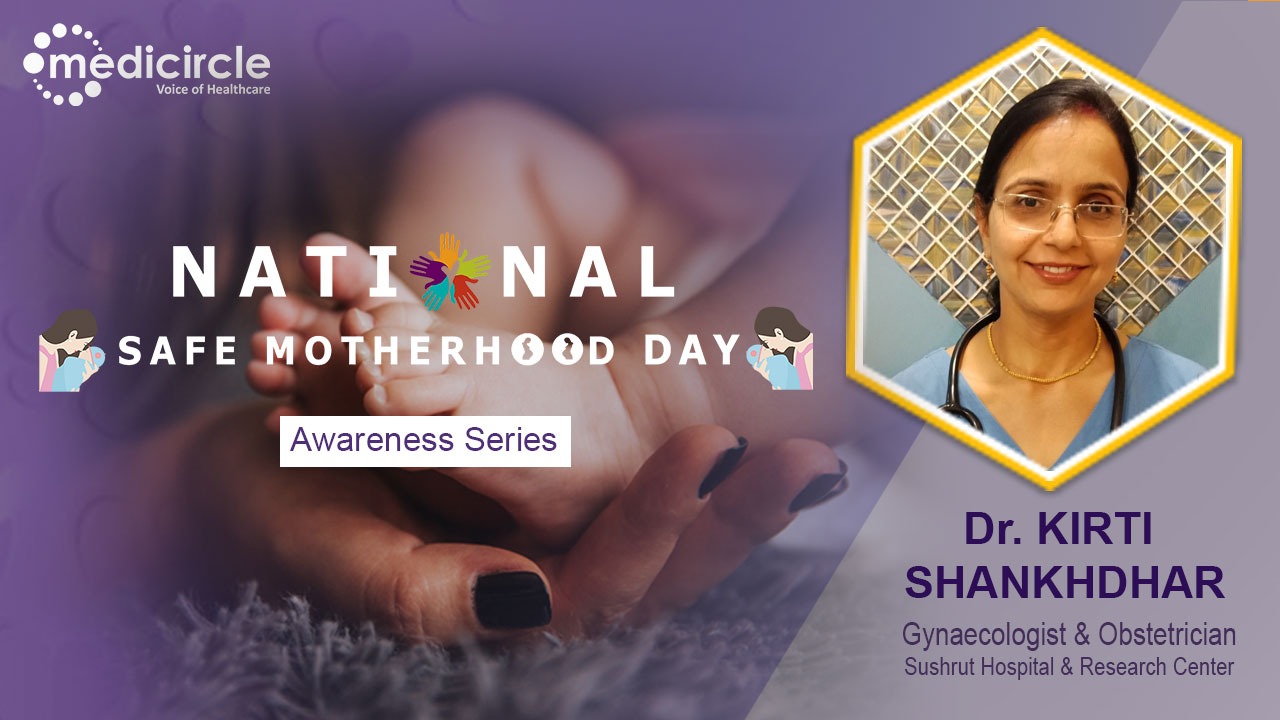The government of India declared the National Safe Motherhood Say in the year 2003. It became the first country to do so. It is an initiative of the White Ribbon Alliance to raise awareness about adequate access to care during pregnancy, childbirth, and postpartum face. White Ribbon Alliance is a coalition of global partners working together to mobilize grassroots efforts to generate worldwide attention and make safe motherhood a priority for governments and international organizations. National Safe Motherhood Day is observed each year in India on the birth anniversary of Kasturba Gandhi, wife of the father of the nation, Mohan Das Gandhi. India is one of the higher-risk nations as far as childbirth is concerned. 15% of the world's maternal deaths take place in India due to improper care during pregnancy. 44,000 women die every year during childbirth. We, at Medicircle, aim to raise awareness about safe motherhood.
Dr. Kirti Shankhdhar is a Gynecologist-Obstetrician in Chembur, Mumbai. She completed her graduation in 1998 from Motilal Nehru Medical College in the first division. She is a postgraduate in Gynecology and Obstetrics and as a diplomate of the National Board for the practice of Gynecology and Obstetrics. She further has to obtain additional two-year high certification. Beyond affiliation with many hospitals, Dr. Kirti Shankhdhar has been professionally active in many other ways.
Important Causes of Maternal Mortality Rate (MMR)
Dr. Kirti Shankhdhar says, “ The important factors for safe motherhood are :
Unwanted pregnancy: Contraceptives are available to everyone. There should be an increase in awareness for every female and her families especially husband and in-laws is very important. Reducing the number of unwanted pregnancies will reduce the Maternal Mortality Rate (MMR) and the complications during pregnancy.
Antenatal checkups: Antenatal care is very important. It is important to detect any pathology at the beginning of the pregnancy to take preventative measures to deteriorate the health of the mother. The duration of pregnancy is 40 weeks. Ideally, WHO recommends, check-up once a month for every pregnant lady till the seventh month and followed by a fortnightly check-up towards the ninth month.
Tetanus immunization: This is the most important thing in our country as most of the deliveries are by untrained staff.
Supplementation: Supplementation is very important during pregnancy. We have to be careful about diet and nutrition during pregnancy.
Nursing: Obstetric care is very important especially in terms of trained staff and nutrition care for mothers. “Good obstetric care” should be the main motto to achieve a healthy pregnancy.
Postpartum care: Female patients should be healthy enough to tolerate pregnancy, delivery, and the postpartum period. The body is coming back to normalcy after pregnancy with a lot of physiological changes happening in the body. Also, they need to take care of the baby.
Postnatal care: Hygiene is very important for the mother and baby. Special precautions should be taken care of during breastfeeding. It is important to take care of the diet and supplementation of mothers to maintain their own health.
Family planning: Complications must be discussed at the time of family planning to reduce the number of abortions and unwanted pregnancies.
Infections: HIV and STDs must be given special attention. Many people indulge in premarital sex and multiple partners which is common in our countries and should be avoided. The use of contraception is a must to prevent STDs. Patients should be educated about the same.
These factors can definitely help in reducing the Maternal Mortality Rate.
Awareness is important to reduce the Maternal Mortality Rate (MMR)
Dr.Shankhdhar informs, “As we go by the data, many females are dying because of the increase in Maternal Mortality Rate. There are many patients who suffer from grave morbidity because of complications. We can improve on that by teaching quality steps. The government of India has started a very good initiative in the form of increasing awareness. Lack of knowledge in the society led to this problem of the Maternal Mortality Rate (MMR).”
The maternal mortality rate must be evaluated
Dr.Shankhdhar states, “ India is the second most populated country in the world. We have a huge population in the world. So if we go by numbers, the cases are always going to be high. The maternal mortality causes can be divided as follows
Maternal mortality during pregnancy Maternal mortality at the time of delivery Maternal mortality 42 days after pregnancy
Maternal mortality includes any complication during pregnancy and does not include any accidents or any other causes”
Leading causes of complications during pregnancy
Dr.Shankhdhar informs, “The leading causes of complications pregnancy are as follows:
Ectopic pregnancies Abortions Hemorrhage during pregnancy Antepartum hemorrhage Hypertension Infections Sepsis
These are the most common complications in pregnant women.”
Importance of antenatal check-up and postpartum care
Dr.Shankhdhar informs, “In India, pregnancy is a huge burden on the body. There are a lot of physiological factors and changes happening in the body during pregnancy. There is an increase in demand in the body during pregnancy. If a woman has diabetes, thyroid issues, or heart diseases, the problems can aggravate the body creating more load on the pregnant lady. A very huge number of maternal and neonatal deaths happen due to deliveries by untrained staff. Proper antenatal health checks up and postpartum care is a must to prevent Maternal Mortality Rate.”
(Edited by Dr.Rati Parwani)

 Dr. Kirti Shankhdhar gives an overview of the need for the reduction of the Maternal Mortality Rate. She emphasizes the importance of antenatal and postpartum care for every mother.
Dr. Kirti Shankhdhar gives an overview of the need for the reduction of the Maternal Mortality Rate. She emphasizes the importance of antenatal and postpartum care for every mother.










.jpeg)

















.jpg)


